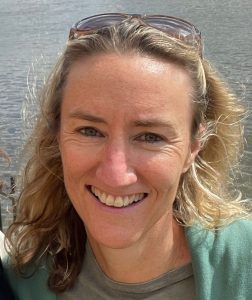
As part of our in profile series, we spoke to Jennifer Crow, NIHR Clinical Doctoral Research Fellow and PhD student at Imperial. Here, she tells us more about her experience in stroke care and what winning the Department of Brain Sciences Public Engagement award means to her.
Introduce yourself – who are you and what do you do?
My name is Jenny Crow and I am a clinical specialist occupational therapist in stroke. I currently have a NIHR Integrated Clinical Doctoral Research Fellowship and am doing a PhD through Imperial College London.
Tell us about your career so far – when did you join the college, and where were you working/studying before this?
My career up until 2019 was focused on my clinical role. I have worked in South Africa, the USA and the UK as an occupational therapist which has been very interesting to see how the role of the occupational therapist varies in the different healthcare systems.
I have been working with people who have had strokes for more than 20 years, initially at St Mary’s Hospital in Paddington and then at Charing Cross Hospital when the Hyperacute Stroke Unit was established in 2009. In 2019 I commenced a NIHR and Stroke Association pre-doctoral clinical academic fellowship and it was at this point that I was fortunate to have Professor Paresh Malhotra as my academic supervisor. I started my PhD with Imperial College in September 2022.
You recently won a DoBS Reward and Recognition Award. What does this mean to you?
Winning the public engagement award was hugely significant to me. Thankfully the importance of doing proper, non-tokenistic, public engagement work is gaining prominence in research funding applications. On many occasions in my clinical role I was asked to review stroke rehabilitation research ideas and to speak to researchers. It seemed to me that the person with stroke had not been consulted and often left out of the planning altogether. I am particularly passionate about trying to engage with people from underrepresented communities and together with the support of Imperial PERC I feel I have made good progress in this area. It was really meaningful to me to be recognised for this.
Can you explain a bit more about your research interests and what initially sparked your interest in your current field?
I am particularly interested in life after stroke and finding out how best we can support and empower people with stroke when they are back at home. This was sparked by patient feedback as well as my own curiosity and concerns that we were discharging people home with limited skills and resources to adjust to life after stroke.
A powerful patient story from a woman who was on our hyperacute stroke unit led to a service improvement project initially, which I managed to get published. She had had a minor stroke and despite appearing physically well had lots of difficulties on discharge and was pushed from pillar to post as she tried to get support and information. This led to my research focus on people who have had so called ‘minor’ strokes as currently they are pretty much left to their own devices after discharge.
What aspect of your role are you most excited about?
I love that I have such a steep learning curve at the moment. Having time to think, read and reflect is a novelty and a luxury after being on the frontline for so long where survival entails just reacting to one crisis after the other. I am particularly excited about the public outreach work that I have been doing and hope that I am a role model to other occupational therapists working in clinical roles to show them that it is possible to pursue a clinical academic career.
When you are not working, what are your main passions and hobbies?
I love going home to South Africa to visit family and to enjoy the wide-open spaces, slower pace of life, sea and sunshine. In London I enjoy swimming at our local health club, and I am also a bit of a fan of hot yoga.
And finally – if you were stranded on a desert island but allowed one luxury item, what would it be?
I am not really interested in luxury items so I would request to swap the luxury item with having my husband with me. He makes me laugh and cooks for me, so he would be an essential ‘item’ on a desert island.